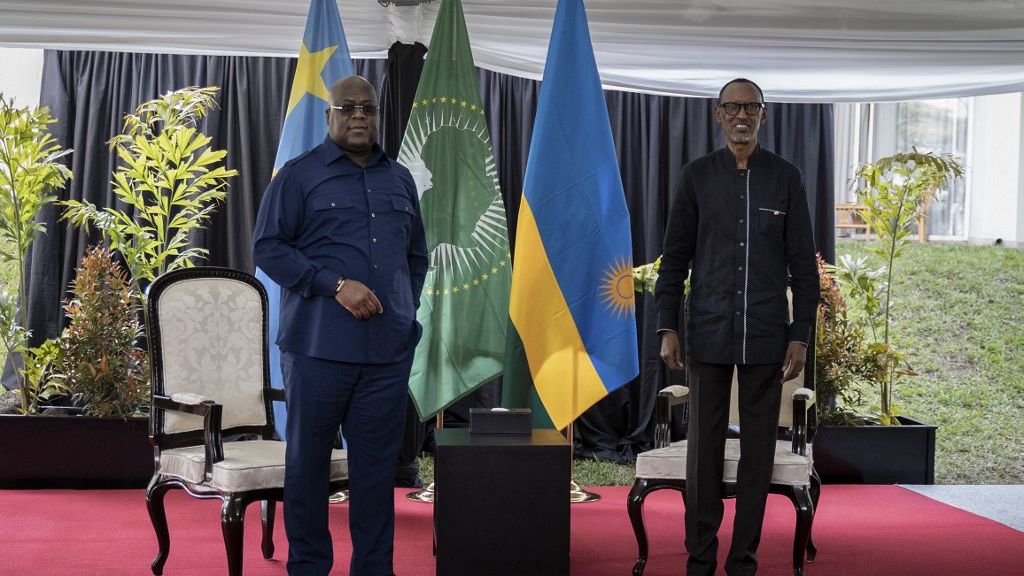Tensions between the Democratic Republic of Congo (DRC) and Rwanda date back to the 1994 genocide in Rwanda when an estimated one million Tutsis and moderate Hutus were killed. Many of the perpetrators of the violence fled to the DRC, at the time called Zaire. The post-genocide Rwandan government launched military operations in a bid to force the perpetrators back home to face justice. To date, the two nations make for very unhappy neighbours as both sides claim the other is set on bringing down their government and violating past peace agreements and international norms. This article attempts to analyse the tensions and why diplomatic attempts to resolve the eastern DRC issue are still futile.
Tensions between the two countries have been a priority for East African Community leaders plus other regional blocs. EAC presidents have severally convened to discuss the security situation in eastern DRC but the vague statements usually released after the meetings have left the newest member of the EAC with no lasting solution. Rwanda continues to accuse the DRC of working with the Democratic Forces for the Liberation of Rwanda (FDL), a rebel group whose stated aim is to overthrow the Rwandan government. On the other hand, the DRC accuses Rwanda of violating its sovereignty by supporting the March 23 Movement (M23) rebels.
These tensions are cause for concern because if unresolved they risk distabilising the East African region, disrupting trade routes and allowing for the establishment of opportunistic militia groups. At the moment the eastern DRC issue is not a top priority to the international community particularly the European Union and the United Nations., and as such it remains an issue in the hands of regional bloc. So far efforts to negotiate a peaceful resolution to these tensions have yielded no results and this can be attributed to a number of reasons.
During conflict resolution, it is important to have all parties to conflict in one room for open and constructive dialogue. Otherwise meeting parties to the conflict separately tends to undermine the validity of the agreement reached. While for eastern DRC’s case the East African Community has deployed a different format and has brokered two peace initiatives, the Nairobi Process and the Luanda Process focusing on armed groups and the DRC-Rwanda political tensions respectively. During the very last summit to discuss the eastern DRC issue held in Burundi’s capital Bujumbura, only attended by President Paul Kagame and his counterpart President Felix Tshisekedi, the leaders of EAC have called for an immediate ceasefire by all parties. However, it is no wonder that reports indicate that the rebels are not respecting ceasefire and withdrawal terms because to them these are terms reached in a room where they are not represented.
As the leaders of the EAC bloc strive for a lasting solution to the conflict in eastern DRC, the fact that security is indivisible meaning that the security of one nation is inseparable from other countries in its region should incentivize the leaders to look beyond their own personal interests and work towards finding lasting diplomatic solutions to this common threat. In the past, Burundi, Uganda and Rwanda have been accused of plundering DRC’s natural resources and these accusations undermine the effectiveness of deploying the East African Standby Force because of its controversial makeup. For stability to be achieved in the DRC through collective efforts, EAC leaders should put aside their personal interests and commit to finding lasting solutions to this conflict for the benefit of the entire region.
Diplomacy is based on mutual understanding and cooperation, and any successful diplomatic resolution to a conflict requires a certain level of power balance among the parties involved. In DRC’s case, however, the parties include state and non-state actors. This implies that there is an unequal balance of power among the parties involved which makes it difficult to reach a mutually beneficial diplomatic agreement. The rebel groups in the DRC pose a security threat not only to the DRC but also Rwanda and Uganda, and opting for diplomacy in conflict resolution is to be cognizant that force is not always the solution. So, while EAC leaders advocate for diplomacy in the question of eastern DRC building mutual understanding and cooperation requires understanding and managing the power dynamics of the parties involved.
In conclusion, the conflict in eastern Democratic Republic of the Congo is quite complex and it is one that is rooted in long-standing ethnic, national, and regional grievances. Additionally, there are numerous armed groups and foreign forces operating in the region, further complicating the situation. The continuous anarchy in this resource-rich nation has displaced 5 million people from their homes and contributed to worsening humanitarian crisis in the region. The crisis in eastern DRC raises concerns on whether the EAC, an economic bloc is capable of mediating and solving conflicts within its boundaries. Solving the eastern DRC conflict will require support from other players such as the African Union, the United Nations for a well aligned and coordinated framework to achieve lasting solution.
By Patricia Namakula
Director of Research and Public Relations


